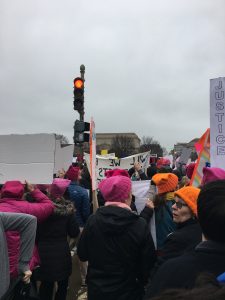
Marching at the Women’s March on Washington. Photo by the author.
Facebook is the largest social network in the world with over two billion users as of the third quarter of 2017 (“Facebook users worldwide 2017”). While started with a simple profile interface, Facebook has now become (with features like the Timeline) “your life” as Mark Zuckerberg would enthusiastically gloat (Hof). A large feature of Facebook is the cultivation and creation of “events” which allow users to plan different activities (Nadkarni and Hofmann 244). Facebook Events have been used in different applications large and small, ranging from birthdays to protests. In 2015, 550 million people used the service monthly (Facebook Events). When a user wants to go to an event they hit a “going” or “ignore” button to let other users know if they will be going and what their interests are. It can create a viral atmosphere that can mobilize people for certain events, especially with the rise of political movements or more furry endeavours such as “dog meet-ups.” Facebook over the course of a few years time has quickly assumed the role of event planner and can signal out to millions of people about different happenings going on.
It is interesting to see, as one of the two billion Facebook users, how important these events have been in my own life and around me. On a given day, I see concert invitations, UBC Calendar parties, protest invitations back from Washington, DC where I grew up, to meme events. It contributes to my digital life where a “friend” or other users can see what “events” I am going to and who I’m going with. It is important because there is a sense of validation on the platform that makes me as a user feel good when a few friends like that I’m going to a specific place.
In January, I went to the Women’s March on Washington, which was started on Facebook by Teresa Shook, a progressive activist motivated to have her voice heard after the election of Donald Trump (Stein). The march was a convergence of social media and the physical world and was able to spread far and wide because of the environment that Facebook had made coupled with frustration and motivation of millions of people who felt similar to Shook. In this sense, Facebook’s events feature was one of the main reasons why the Women’s March became the largest protest in U.S. history and one of the largest global marches.
Facebook as a social media empire has many features of the internet encapsulated into one place. In this sense, Zuckerberg’s words about Facebook becoming one’s life is becoming true, but as the network grows and evolves, its uses will continue to have large impacts on the discussion of one’s personal story, the events and the movements they follow in the physical domain.
Works Cited
Broomfield, Matt. “Women’s March Against Donald Trump is the Largest Day of Protests in US History, Say Political Scientists.” The Independent Jan 23, 2017. Web. Nov 13, 2017 <http://www.independent.co.uk/news/world/americas/womens-march-anti-donald-trump-womens-rights-largest-protest-demonstration-us-history-political-a7541081.html>.
Facebook Events. Web. Nov 13, 2017. <https://events.fb.com/#why-facebook-events>.
“Facebook users worldwide 2017.” Statista. 2017. Web. Nov 13, 2017 <https://www.statista.com/statistics/264810/number-of-monthly-active-facebook-users-worldwide/>.
Hof, Robert. “LIVE with Mark Zuckerberg at F8: Facebook Is Your Life.” Forbes. Sept 22, 2011. Web. Nov 13, 2017 <https://www.forbes.com/sites/roberthof/2011/09/22/live-with-mark-zuckerberg-at-facebook-f8/>.
Kittner, Maxwell. Women’s March at 7th and Madison Sts NW. 2017. , Washington, DC.
Mehran Meh, Ran. Biggest Dog Meet Ever. Vancouver., 2017. Web. <https://www.facebook.com/events/116331715707477/>.
Nadkarni, Ashwini, and Stefan G. Hofmann. “Why do People use Facebook?” Personality and Individual Differences 52.3 (2012): 243-9. Web. Nov 13, 2017.
Perry Stein. “The woman who started the Women’s March with a Facebook post reflects: ‘It was mind-boggling’.” Washington Post – Blogs. Jan 31, 2017. Web. <https://search.proquest.com/docview/1863541403>.